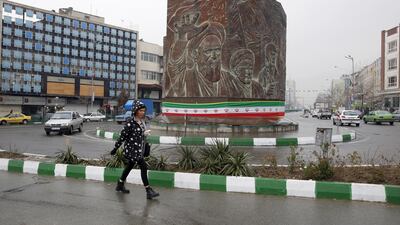Britain summoned Iran’s most senior diplomat on Monday to make clear that threats to journalists on UK soil “will never go unchallenged” after a Persian language TV channel was forced to close its London newsroom.
Foreign Secretary James Cleverly said he was “appalled by the Iranian regime’s continuing threats to the lives of UK-based journalists” following Iran International's decision to temporarily close its UK operation.
Security was tight at Chiswick Business Park when The National visited on Monday, two days after the broadcaster announced major changes.
A source at the channel told The National: “We’re on air, uninterrupted, broadcasting from our DC studios.”
The insider said newsgathering from the UK team is “operating normally” while staff are working from locations away from the office. While some members of its roughly 100-strong team in Britain have been sent to the US, others have been told to work from home.
The decision was taken months after members of the team were sent death threats by Iran, prompting the Metropolitan Police to undertake a counter-terrorism operation in the once quiet neighbourhood.
Mr Cleverly’s summons of the Iranian charge d’affaires came as the UK government announced sanctions against eight more individuals over their alleged roles in human rights abuses.
Members of the Islamic Revolutionary Guard Corps, including the commander of a province in which security forces have severely injured and killed children, and three senior judges were among the latest names to make it on to Britain’s growing list of individuals and organisations.
The judges had imposed death penalties on people who took part in anti-government protests in Iran in recent months, the UK said.
“The UK will always stand up to countries who threaten our fundamental values of freedom of expression and the media,” Mr Cleverly said.
“I am appalled by the Iranian regime’s continuing threats to the lives of UK-based journalists and have today summoned its representative to make clear this will not be tolerated.
“As part of wider efforts to hold Iran to account, the UK has today also sanctioned a further eight individuals responsible for horrific human rights violations in Iran, including the killing of children. We will never allow the regime’s threats to go unchallenged.”
His statement came hours after Vijay Rangarajan, the Foreign Office’s director general for the Middle East, held tense talks with Mehdi Hosseini Matin, Iran’s senior diplomat in London.
The Conservative government has resisted calls from MPs across the political spectrum to proscribe the Islamic Revolutionary Guard Corps as a terrorist organisation.
The government’s announcement of further punitive measures against Iran coincided with a similar statement from the EU.
Brussels imposed sanctions on a further 32 Iranian individuals including government ministers, intelligence officials and lawmakers as part of the bloc’s latest raft of punitive measures against the regime over its treatment of protesters.
Two organisations and dozens of officials were hit by asset freezes because of their involvement “in serious human rights violations in Iran,” Brussels said in a statement. The individuals involved are also subject to travel bans.
Tehran’s culture and education ministers are among the latest cohort to be punished by the 27-nation bloc over a crackdown on demonstrators.
The EU had already imposed four rounds of sanctions on Iran targeting other ministers, military officers and members of the morality police for alleged human rights abuses.
The latest action from Europe came five months after the death of Mahsa Amini in Iran sparked widespread protests and an international outcry. The 22-year-old Kurdish woman was arrested by the Islamic Republic’s morality police for allegedly not wearing her hijab properly.
She died on September 16 from what her family claim were severe injuries caused by beatings in custody.
The rallies that sprung up in towns and cities across the nation pose one of the most serious challenges to Iran’s theocracy since the 1979 Islamic Revolution.
At least 529 people have been killed in anti-government demonstrations, according to Human Rights Activists in Iran.
More than 19,700 others have been detained by authorities amid a violent crackdown trying to suppress the dissent.
Some people linked to the protests have been tried, convicted and executed for capital crimes.
Following Iran International's decision to close its UK office, Tom Tugendhat, Britain's security minister, took to Twitter to say Tehran “will not succeed” in its efforts to silence journalists who criticise the regime's actions.
“The Iranian regime’s threats to assassinate UK-based journalists and harm their families are beyond contempt,” Mr Tugendhat wrote on social media. “Their efforts to silence Iran International TV are a direct attack on our freedoms and an attempt to undermine our sovereignty.
“They will not succeed.”
He said staff at the broadcaster had shown “courage” in the face of threats from Iran.
“We'll continue providing them with every form of support to ensure that they can continue their work in safety from the UK,” he added.
The National visited Iran International's London newsroom last November where Aliasghar Ramezanpour, executive editor of the channel, said staff were “feeling that they are working in a kind of war zone.”


